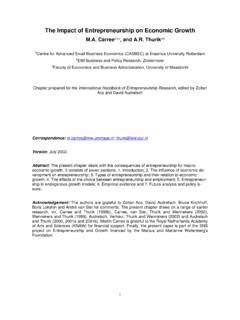Transcription of Tax planning by multinational firms: Firm-level evidence ...
1 Unclassified ECO/WKP(2016)79 Organisation de Coop ration et de D veloppement conomiques Organisation for Economic Co-operation and Development 06-Feb-2017 _____ English - Or. English ECONOMICS DEPARTMENT TAX planning BY multinational FIRMS: Firm-level evidence FROM A CROSS-COUNTRY DATABASE ECONOMICS DEPARTMENTS WORKING PAPERS No. 1355 By sa Johansson, ystein Bieltvedt Skeie, St phane Sorbe and Carlo Menon OECD Working Papers should not be reported as representing the official views of the OECD or of its member countries. The opinions expressed and arguments employed are those of the author(s).
2 Authorised for publication by Christian Kastrop, Director, Policy Studies Branch, Economics Department. All Economics Department Working Papers are available at JT03408612 Complete document available on OLIS in its original format This document and any map included herein are without prejudice to the status of or sovereignty over any territory, to the delimitation of international frontiers and boundaries and to the name of any territory, city or area. ECO/WKP(2016)79 Unclassified English - Or. English ECO/WKP(2016)79 2 OECD Working Papers should not be reported as representing the official views of the OECD or of its member countries.
3 The opinions expressed and arguments employed are those of the author(s). Working Papers describe preliminary results or research in progress by the author(s) and are published to stimulate discussion on a broad range of issues on which the OECD works. Comments on Working Papers are welcomed, and may be sent to OECD Economics Department, 2 rue Andr Pascal, 75775 Paris Cedex 16, France, or by e-mail to All Economics Department Working Papers are available at This document and any map included herein are without prejudice to the status of or sovereignty over any territory, to the delimitation of international frontiers and boundaries and to the name of any territory, city or area.
4 The statistical data for Israel are supplied by and under the responsibility of the relevant Israeli authorities. The use of such data by the OECD is without prejudice to the status of the Golan Heights, East Jerusalem and Israeli settlements in the West Bank under the terms of international law. Latvia was not an OECD Member at the time of preparation of this publication. Accordingly, Latvia does not appear in the list of OECD Members and is not included in the zone aggregates. OECD (2016) You can copy, download or print OECD content for your own use, and you can include excerpts from OECD publications, databases and multimedia products in your own documents, presentations, blogs, websites and teaching materials, provided that suitable acknowledgment of OECD as source and copyright owner is given.
5 All requests for commercial use and translation rights should be submitted to ECO/WKP(2016)79 3 ABSTRACT/R SUM Tax planning by multinational firms: Firm-level evidence from a cross-country database This paper exploits Firm-level data from the ORBIS database to assess international tax planning by multinational enterprises (MNEs). Profit shifting to lower-tax rate countries is measured by comparing the profitability of MNE entities having different links to countries with different tax rates and thus different profit shifting opportunities. The paper also considers other aspects of tax planning that have been less documented in the empirical literature, such as the exploitation of mismatches between tax systems and preferential tax regimes, by comparing how profits reported by MNE entities are taxed relative to non- multinational entities with similar characteristics.
6 The analysis builds on available unconsolidated financial account data, which, despite its limitations, is considered as the best existing cross-country Firm-level data. Results are based on a very large sample of firms ( million observations of MNE accounts) in 46 OECD and G20 countries and a sophisticated procedure to identify MNE groups. They provide robust evidence that MNEs shift profits to lower-tax rate countries and that large MNEs also exploit mismatches between tax systems and preferential tax treatment to reduce their tax burden. Overall, the estimated net tax revenue loss ranges from 4% to 10% of global corporate tax revenues.
7 The empirical analysis also shows that strong anti-avoidance rules against tax planning are associated with reduced profit shifting, but also higher compliance costs for firms. JEL classification: H25; H26; H32; F23 Key words: multinational tax planning ; base erosion; profit shifting; corporate income tax; Firm-level data Planification fiscale des entreprises multinationales: des preuves bas es sur des donn es internationales d'entreprises Ce document exploite les donn es d entreprises de la base de donn es ORBIS pour valuer la planification fiscale internationale des entreprises multinationales. Les transferts de b n fices vers les pays taux d'imposition inf rieur sont mesur s en comparant la rentabilit des entit s multinationales ayant des liens diff rents avec des pays ayant des taux d'imposition diff rents et donc diff rentes possibilit s de transferts de b n fices.
8 Le document examine galement d'autres aspects de la planification fiscale qui ont t moins document s dans la litt rature empirique, comme l'exploitation des disparit s entre les syst mes fiscaux et les r gimes fiscaux pr f rentiels, en comparant la fa on dont les b n fices d clar s par les entit s multinationales sont impos s par rapport des entit s non-multinationales avec des caract ristiques similaires. L'analyse se fonde sur des donn es financi res non consolid es, qui, malgr leurs limites, sont consid r es comme le meilleur chantillon international de donn es d entreprises existant.
9 Les r sultats sont bas s sur un tr s grand chantillon d'entreprises (1,2 millions d'observations de comptes de multinationales) dans 46 pays de l'OCDE et du G20 et une proc dure sophistiqu e pour identifier les groupes multinationaux. Ils fournissent des preuves solides que les multinationales transf rent leurs b n fices vers les pays taux d imposition inf rieur et que les grandes multinationales exploitent galement les disparit s entre les syst mes fiscaux et les traitements fiscaux pr f rentiels pour r duire leur fardeau fiscal. Au total, la perte de recettes fiscales nette estim e varie de 4% 10% des recettes mondiales d imp t sur les soci t s.
10 L'analyse empirique montre galement que des r gles strictes anti- vitement contre la planification fiscale sont associ s des transferts de b n fices r duits, mais aussi des co ts de conformit plus lev s pour les entreprises. Classification JEL: H25; H26; H32; F23 Mots cl s: Planification fiscale internationale, imp ts sur les soci t s, donn es au niveau de l'entreprise ECO/WKP(2016)79 4 TABLE OF CONTENTS KEY FINDINGS .. 6 1. Introduction and main findings .. 6 2. Tax planning channels and the BEPS Action Plan .. 8 3. Empirical strategy .. 10 Profit shifting .. 10 Mismatches between tax systems and preferential tax treatment.
















